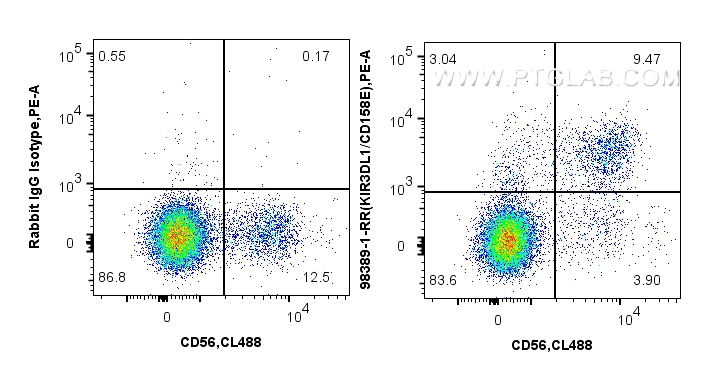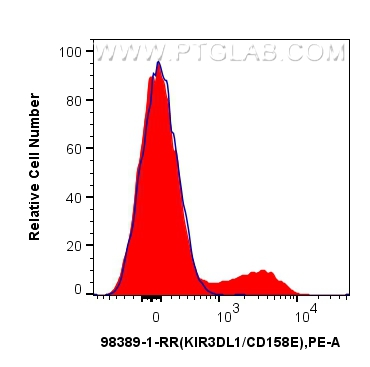验证数据展示
经过测试的应用
| Positive FC detected in | human PBMCs |
推荐稀释比
| 应用 | 推荐稀释比 |
|---|---|
| Flow Cytometry (FC) | FC : 0.25 ug per 10^6 cells in 100 μl suspension |
| This reagent has been tested for flow cytometric analysis. It is recommended that this reagent should be titrated in each testing system to obtain optimal results. | |
| Sample-dependent, Check data in validation data gallery. | |
产品信息
98389-1-RR targets KIR3DL1/CD158E in FC applications and shows reactivity with human samples.
| 经测试应用 | FC Application Description |
| 经测试反应性 | human |
| 免疫原 |
fusion protein 种属同源性预测 |
| 宿主/亚型 | Rabbit / IgG |
| 抗体类别 | Recombinant |
| 产品类型 | Antibody |
| 全称 | killer cell immunoglobulin-like receptor, three domains, long cytoplasmic tail, 1 |
| 别名 | KIR3DL1, CD158 antigen-like family member E, CD158E, CD158E1, HLA-BW4-specific inhibitory NK cell receptor |
| 计算分子量 | 49 kDa |
| GenBank蛋白编号 | NM_013289.4 |
| 基因名称 | KIR3DL1 |
| Gene ID (NCBI) | 3811 |
| 偶联类型 | Unconjugated |
| 形式 | Liquid |
| 纯化方式 | Protein A purification |
| UNIPROT ID | P43629-1 |
| 储存缓冲液 | PBS with 0.09% sodium azide, pH 7.3. |
| 储存条件 | Store at 2 - 8°C. Stable for one year after shipment. |
背景介绍
Killer cell immunoglobulin-like receptors (KIRs) are transmembrane glycoproteins expressed by natural killer cells and subsets of T cells. The KIR proteins are classified by the number of extracellular immunoglobulin domains (2D or 3D) and by whether they have a long (L) or short (S) cytoplasmic domain. KIR3DL1 is a receptor on natural killer (NK) cells for HLA Bw4 allele. It inhibits the activity of NK cells thus preventing cell lysis. KIR3DL1 and KIR3DS1 are highly homologous.
实验方案
| Product Specific Protocols | |
|---|---|
| FC protocol for KIR3DL1/CD158E antibody 98389-1-RR | Download protocol |
| Standard Protocols | |
|---|---|
| Click here to view our Standard Protocols |

